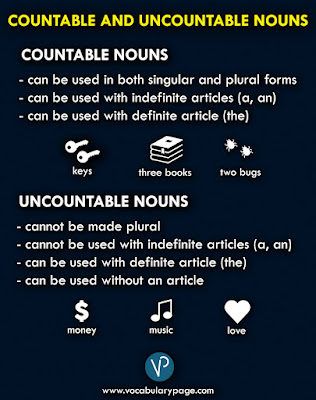In English, nouns can be categorized as countable or uncountable. Countable nouns are things we can count, such as "book", "apple" or "dog". We can make them plural. Uncountable nouns, also known as mass nouns, are things we cannot count, such as "water, "happiness" or "information". They have no plural. Here are some more uncountable nouns:
- milk, juice, flour, rice
- air, wood, plastic, steel
- love, anger, advice, wisdom
- money, news, music, luggage
Firstly, it is important to understand that uncountable nouns are always singular. They take a singular verb.
- The weather is nice today.
- The news travels fast in this small town.
Uncountable nouns do not have a plural form. This means that we cannot add "-s" at the end of a noun to show that there is more than one of it. For example, we cannot say "waters" or "moneys"
Uncountable nouns cannon be used with the indefinite articles a/an, which are used with singular countable nouns. For example, we cannot say "a information" or "a music". But, we can use partitive expressions to count or quantify many uncountable nouns.
- a piece of news
- a bit of advice
- a slice of bread
- a grain of rice
- There's some sugar left in the bowl.
- Do you have any flour left for the recipe?
- Much money doesn't guarantee happiness.
- I prefer my coffee with a little milk and sugar
- I don't have much hair. (uncountable)
- I found two hairs on my plate. (countable)

Comments
Post a Comment